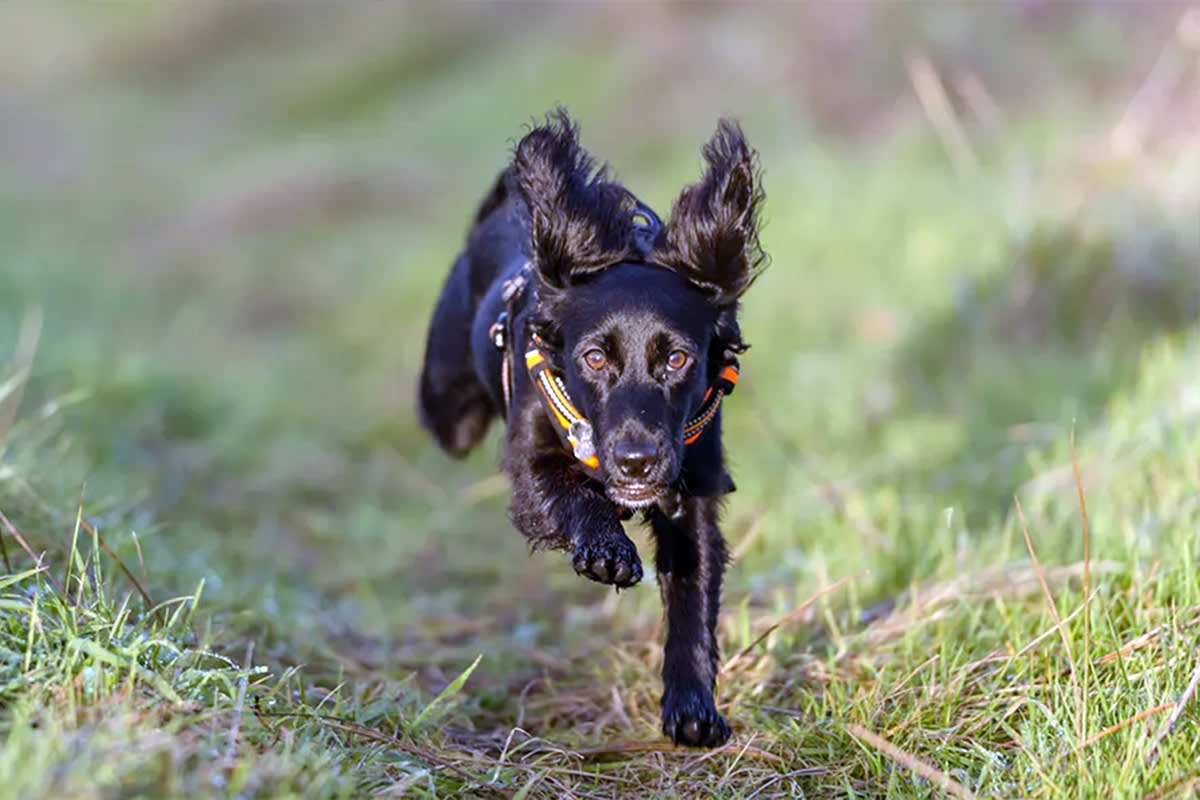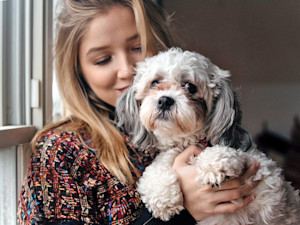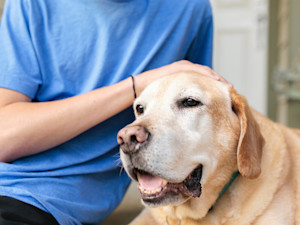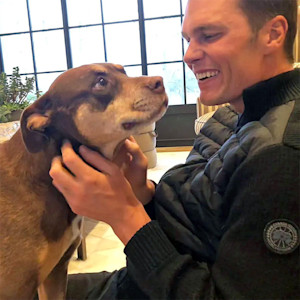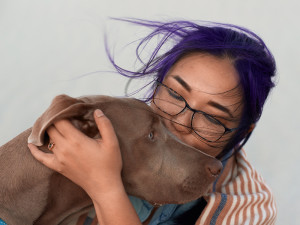5 Dreams You May Have About Your Pet After They’re Gone—And What They Mean
It can be healing to see your buddy again in your sleep.

Share Article
If you’ve ever lost a pet, they’ve likely turned up in your dreams, even long after they’ve died. Seeing your beloved dog or cat again, if only briefly, can feel like a special treat, a way to extend your time together. Even when you wake up the next morning and recall they’re still gone, the nightly encounter can serve as a small antidote to your loss.
According to Judith Eve Rosenopens in new tab, LCSW, and certified veterinary social worker who counsels patients in pet bereavement, dreaming about your deceased pet is a very common phenomenon — and a therapeutic one. “Overwhelmingly, the dream is a positive experience,” she tells Kinship. “I think it’s the brain’s way of comforting you.”
Rosen explains the “continuing bonds”opens in new tab theory of processing grief: the idea of continuing the relationship with your loved one after they’re not physically here anymore might prove more healing than attempting to sever the connection. Dreaming about your pet would be one way to keep that bond intact.
Dreams about our pets present in a few common forms: from picturing them young and healthy, to vividly feeling their touch, to even communicating with them. We spoke with experts about the different types of pet-grief dreams and the ways they might comfort us, depending on where we are in our grief process.

How to feel connected with your deceased pet
If you’re longing to dream about your deceased pet, or feel a deeper connection to them whether you’re asleep or awake, there are rituals to help foster that bond, says Wendy Van de Pollopens in new tab, a certified end-of-life and grief coach specializing in pet loss.
Van de Poll suggests setting an intention before bed, asking for a message from your pet. You can also journal, or spend time in a favorite place you shared with your animal. This can be in nature or even somewhere like the living room couch — anywhere that can be a “communication space” that creates a “portal for connection."
Similarly, Rosen suggests spending time with objects that remind you of your pet, like a collar or a favorite toy: “Hold them in your hand, and you’ll feel connected to them,” she says.
5 dreams you might you have about your lost loved one
Physical touch/extra-sensory dreams
You might dream that your dog is licking your face or you’re petting their fur; it can feel so vivid and tactile that the sensation stays with you after you wake up.
Van de Poll says these dreams are common among clients who are early on in their grief, distraught and longing for physical connection with their pet. “Just because the animal isn’t with us anymore, there is a sensory vividness that our nervous system remembers,” she adds. Experiencing their physicality again in a dream state may help the brain integrate the loss, and help the bereft feel safe and loved.
Dreams where you picture them young and healthy
Seeing your pet at their best and happiest life stage can bring a lot of comfort, Rosen says.
“If someone has a dream that their dog is running free in a beautiful place, that imagery can really help them move into acceptance,” Van de Poll says.
It may also signal that you’re moving on from feeling deep sadness over the loss, to a place where you can cherish, and even experience joy, in remembering them.
Dreams in which you relive their passing
In rare cases, with pet parents that experienced some trauma in their pet’s passing — perhaps a sudden accident, or a pet succumbing to cancer at a young age — they may relive the experience of their pet’s death in a dream as a way of coping with their guilt over what happened. This may also bring up thoughts of what they could have done differently.
“If the grief is so raw and new and traumatic, they’ll dream over and over again the sequence of the events,” Van de Poll says.
Rosen says that in this case, the client may benefit from PTSD therapy.
Dreams in which they come back from the dead, or their death was a mistake
In the first months after my dog Phoebe passed, I often dreamed that she was unexpectedly back in the house. It was either that she’d come back from the dead, or that I’d gotten it wrong, and her death hadn’t actually occurred.
“It could be a bit of denial or disbelief, that your mind is struggling to accept the finality of it all,” Van de Poll says. “It could also be a wish fulfillment. Or, a symbolic resurrection: They still live on within you.”
Dreams where they communicate with you
You may have dreams where your pet is speaking to you or relaying a message as though telepathically. Maybe you’re face to face with them, or you’re watching a movie with the both of you in it; you may wake up, and you’ll sense them in the room. Typically, these dreams give reassurance that the emotional bond between you and your animal is still strong. Van de Koll calls it a “wisdom message” that comes when a patient is close to acceptance of their loved one’s passing.
These dreams can bring us closure. “The dreams are teaching you, ‘[Your pet’s] not here, they’re somewhere else, but they’re OK where they are,’” Rosen says.
What if you don’t dream about them?
If you've never dreamed about your deceased pet, that’s totally normal, too.
It could be that you simply don’t remember your dreams. Or, perhaps you don’t need the dreams, either because you’ve already accepted their death, or, because of your cultural beliefs, death isn’t necessarily distressing to you, explained Rosen.
Or maybe you haven’t dreamed about them, but you experience a “felt sense” during waking hours that they’re still here with you, almost like the sensation of a missing limb, or a visit from a friendly, furry ghost, and that serves the same comforting purpose. Some grieving pet parents might even see or hear their pets — spot a flash of their tail, hear their collar jingle, or, like me, see their perfect image in a bird poop splatter on the car windshield — which is sometimes referred to as “bereavement hallucinationopens in new tab” but may also provide solace.
“Grief looks different on every individual, and each loss is processed differently,” she says. “If you don’t have these dreams, it doesn’t mean you love them any less.”
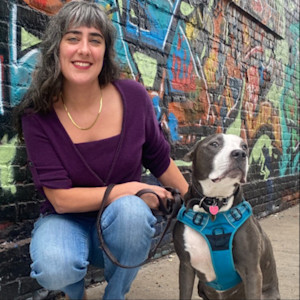
Kate Mooney
Kate Mooney is a Brooklyn-based writer with work in The New York Times, GQ, Vox, and more.
Related articles
![blonde woman holding older white dog]()
Why People Say Pets Cross the “Rainbow Bridge” When They Die—And How It Helps
It’s become part of the pet-parent vernacular as a source of comfort.
![Portrait Of Large, Senior, Mixed Breed Dog On Beach]()
How to Grieve a Pet
For National Pet Memorial Day — Sept. 12th — we asked 5 grief experts how to cope with feelings of guilt after we lose a pet.
![Woman comforting her friend who has lost a pet.]()
10 Ways to Support a Friend Who Is Grieving a Pet
Not everyone understands how hard it is to lose a pet. You can be the person who does.
![Man petting his senior Lab dog on the porch.]()
Anticipatory Grief for an Aging—or Even Young—Pet Is a Very Real Thing
Are you already feeling sad about losing your pet even though they're still alive?
![Tom Brady with a Pit Bull mix]()
Tom Brady Reveals His Dog Junie Is the Clone of His Departed Pit Bull
Seventy-four percent of Gen Z pet parents say they’d do the same.
![Woman with purple hair kissing the face of her chocolate brown hound dog]()
8 Comforting Thoughts to Help You Through the Death of Your Pet
There’s no guidebook to grief and loss — but these kind words will help.
